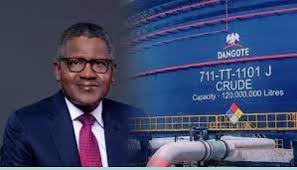The Dangote Petroleum Refinery has announced a major step to make fuel cheaper and easier to access across Nigeria. From Monday, August 12, 2025, the refinery reduced its ex-depot price of Premium Motor Spirit (PMS), also called petrol, from ₦850 to ₦820 per litre. This was confirmed in a statement by Anthony Chiejina, Chief of Branding and Communications for the Dangote Group, and shared on the company’s official X social media page.
Alongside the price cut, the refinery will launch a new fuel distribution plan starting Thursday, August 15, 2025. It will roll out a fleet of 4,000 compressed natural gas (CNG) powered trucks to deliver petrol and diesel directly to retail filling stations, manufacturers, telecom operators, and other major fuel users across the country.
According to the company, this is part of a massive ₦720 billion investment aimed at improving Nigeria’s fuel distribution network. The introduction of CNG-powered trucks is expected to cut logistics costs significantly and make fuel supply more reliable nationwide.
Vice-President of Oil and Gas at Dangote Industries Limited, Devakumar Edwin, officially received the first batch of the trucks at the refinery site in Ibeju-Lekki, Lagos State. He said the initiative would help Nigeria take the lead in cleaner and more efficient fuel transportation across Africa. Edwin added that the use of CNG trucks would not only reduce costs but also cut carbon emissions, supporting global environmental targets.
The company estimates that switching to CNG trucks could save Nigerians over ₦1.7 trillion annually in fuel distribution costs. The plan is also expected to create more than 15,000 jobs across the country, revive dormant filling stations, and reduce the smuggling of petrol to neighbouring countries. Dangote Industries said this could also help boost fuel availability in remote areas where supply has been inconsistent.
In addition, the new system is expected to benefit more than 42 million micro, small, and medium enterprises (MSMEs) in Nigeria by lowering energy costs. Cheaper fuel could improve profitability for small businesses and reduce transportation costs for goods and services.
This development comes as Nigeria continues to face challenges in its petroleum supply chain. With the removal of petrol subsidy in 2023, fuel prices have been rising, putting pressure on households and businesses. The Dangote Refinery’s move to cut prices and improve logistics aligns with the government’s broader energy independence goals.
Located in the Lekki Free Trade Zone, the Dangote Refinery is the largest single-train refinery in Africa. It started operations in mid-2023 and currently runs at about 85 percent capacity, producing 500,000 barrels of refined products per day. The company plans to increase production to 650,000 barrels per day in the near future.
Energy experts believe these moves could transform Nigeria’s downstream petroleum sector. By combining lower ex-depot prices with an efficient delivery system, the refinery could help reduce inflationary pressures linked to fuel costs, improve availability, and strengthen the country’s energy security.
However, analysts also note that the full benefits will depend on coordination between the Dangote Refinery, existing fuel marketers, and regulatory agencies. Maintaining consistent supply, avoiding distribution bottlenecks, and ensuring competitive pricing at retail outlets will be crucial for long-term success.
For now, Nigerians can expect some relief at the pump as the price cut takes effect and the CNG-powered trucks begin operations. The move marks a significant shift toward efficiency and accessibility in Nigeria’s fuel supply chain, giving hope for a more stable and affordable energy future.
